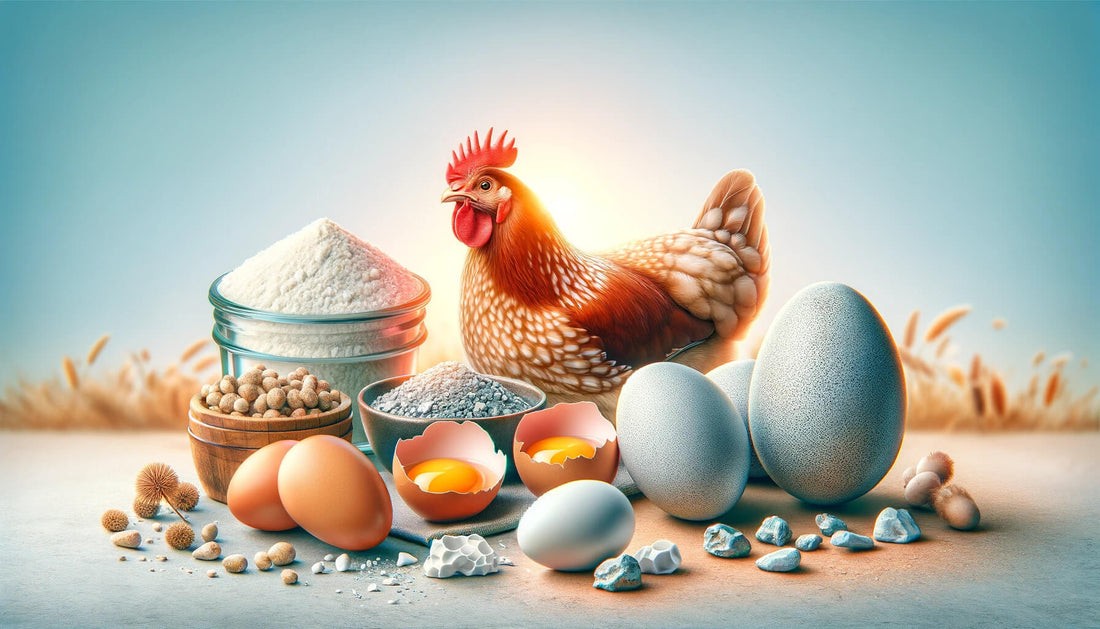
Why Is Calcium Important for Chickens?
Share
The Impact of High-Calcium Foods on Egg and Chicken Health
Calcium is a vital nutrient in poultry diets, particularly for laying hens. Its role extends beyond simply forming the eggshell; calcium also plays a critical part in the overall health and productivity of chickens. This blog explores how high-calcium foods impact both the quality of eggs and the well-being of chickens.
Why Is Calcium Important for Chickens?
-
Eggshell Formation:
Chickens require calcium to form strong, durable eggshells. Without sufficient calcium, hens may produce eggs with thin or brittle shells, which are prone to cracking during handling or transport. -
Bone Health:
Calcium is stored in the hen’s bones, particularly in the medullary bone tissue, which acts as a reserve for eggshell production. A diet deficient in calcium can weaken the skeleton, increasing the risk of fractures. -
Optimal Growth:
In growing chickens, calcium contributes to bone development, ensuring they grow into healthy and productive adults.
Sources of High-Calcium Foods
-
Limestone and Oyster Shells:
These are common supplements in poultry diets. Finely ground limestone and crushed oyster shells are excellent sources of bioavailable calcium for chickens. -
Leafy Greens:
Kale, spinach, and other leafy greens offer natural calcium content, though their oxalate levels should be monitored to avoid nutrient absorption interference. -
Dairy Byproducts:
Some farmers include dairy products like whey or yogurt, though these are less commonly used in large-scale poultry operations. -
Calcium-Enriched Feed:
Commercial feeds are often fortified with calcium, ensuring a balanced diet for laying hens.
Effects on Egg Quality
-
Shell Strength and Thickness:
Adequate calcium intake leads to consistently strong eggshells, reducing losses from breakage. -
Yolk and Albumen Quality:
While calcium doesn't directly impact the yolk or albumen, a healthier hen overall produces better-quality eggs. -
Egg Size:
High-calcium diets, when combined with balanced protein and energy intake, contribute to optimal egg size.
Impact on Chicken Health
-
Prevention of Hypocalcemia:
Insufficient calcium can cause hypocalcemia, leading to soft bones, poor posture, and a decrease in egg production. -
Enhanced Longevity:
Consistent calcium supplementation ensures hens maintain bone health throughout their laying cycle, extending their productive lifespan. -
Reduced Stress:
A well-fed hen is less likely to experience stress-induced conditions, such as feather pecking or laying cessation.
Balancing Calcium in Diets
While calcium is essential, over-supplementation can lead to complications such as kidney damage or reduced phosphorus absorption. A balanced diet with the right ratio of calcium to phosphorus is critical. Typically, laying hens require about 4% calcium in their diet, while non-laying chickens need significantly less.
Conclusion
High-calcium foods are indispensable for chicken health and egg production. Farmers and poultry keepers should ensure their flocks receive a balanced diet tailored to their stage of life and production cycle. By doing so, they can optimize egg quality, improve chicken health, and maintain a sustainable and productive poultry operation.
What are your favorite calcium sources for your chickens? Share your insights and experiences in the comments!
